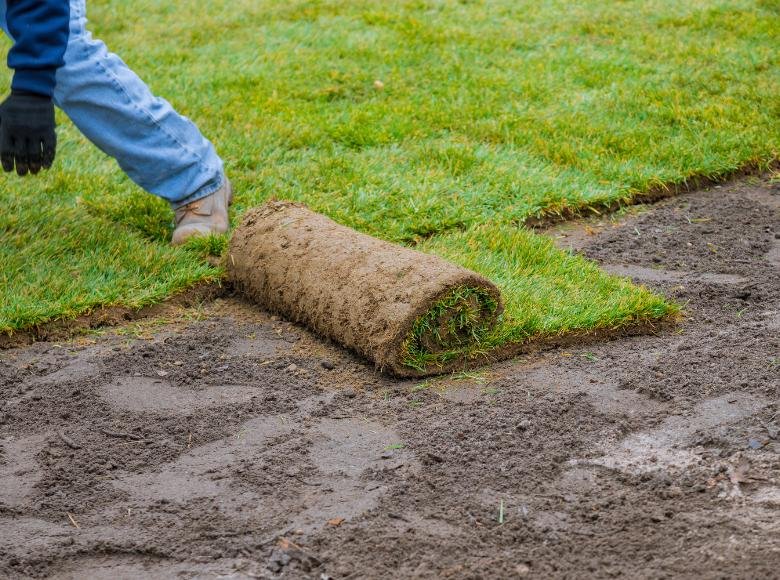Sod grass laying tips for a lush golf course are selecting the right sod variety, thoroughly preparing the soil, prompt installation, proper watering, and regular maintenance.
Sod grass stands as the green carpet that elevates a golf course, providing not only aesthetic allure but also playing surfaces that golfers dream of. In this comprehensive guide, we’ll explore the integral role of sod grass in golf, look into the dos and don’ts of sod grass installation, and examine its profound impact on golf course maintenance, particularly in the unique context of Florida’s golfing landscapes.
What is Sod Grass and Its Involvement in Golf
Sod grass, or turfgrass, is the carefully cultivated grass and the layer of soil beneath it, held together by its roots. Its involvement in golf is significant, contributing to the creation and maintenance of the verdant fairways and immaculate greens that define a premium golfing experience. Unlike traditional seeding methods, sod grass installation provides an instant, mature grass cover that not only enhances the visual appeal of the course but also ensures a consistent and high-quality playing surface.
Sod Grass Laying Tips
Select the Right Sod Variety: Choose sod grass varieties suitable for Florida’s climate, considering factors like sunlight, water availability, and foot traffic.
Thorough Soil Preparation: Ensure proper soil preparation, including leveling, debris removal, and addressing nutrient deficiencies, to create an ideal foundation for sod installation.
Prompt Installation: Time is crucial; install sod promptly after harvesting to prevent drying and ensure its health and viability.
Proper Watering: Provide adequate and consistent watering, especially in the initial weeks, to promote robust root development and overall sod health.
Regular Maintenance: Implement a comprehensive maintenance plan, including regular mowing, fertilization, aeration, and pest control, to sustain the lushness and playability of the golf course.

Do’s and Don’ts of Sod Grass Installation
Now, let’s look into the do’s and don’ts of sod grass installation.
Do:
Choose the Right Sod Variety: Different grass varieties thrive under different conditions. Consider factors such as sunlight, water availability, and foot traffic when selecting sod grass for a golf course in Florida.
Prepare the Soil Adequately: Proper soil preparation is the foundation for successful sod grass installation. Level the surface, remove debris, and address any soil nutrient deficiencies.
Ensure Proper Watering: Adequate hydration is critical during the initial stages of sod installation. Regular watering, especially in the first few weeks, promotes robust root development.
Don’t:
Delay Installation: Time is of the essence once sod is harvested. Prompt installation is crucial to prevent the sod from drying out, ensuring its health and viability.
Skip Soil Testing: Neglecting soil testing can lead to issues like nutrient imbalances or pH problems, jeopardizing the long-term health and vibrancy of the sod.
How Sod Grass Impacts Golf Courses
The impact of sod grass on a golf course extends beyond mere aesthetics; it significantly influences the playability and overall health of the course.
Consistent Playing Surface: Sod grass provides a uniform and predictable playing surface, ensuring that golfers experience a consistent quality of play across the entire course.
Erosion Control: Particularly vital for the often-sloped terrain of golf courses, sod acts as a natural erosion control measure, preventing soil erosion during heavy rains or irrigation.
Aesthetics and Brand Image: The visual appeal of a golf course is a crucial element of its brand image. Well-maintained sodded surfaces enhance the overall aesthetics, creating an inviting and pristine environment for golfers.
Quick Recovery: Sodded areas recover rapidly from stress, be it heavy foot traffic or adverse weather conditions. This ensures that the golf course remains playable and attractive throughout the year.
Golf Course Maintenance with Sod Grass
Effective maintenance of a golf course involves strategic care for sodded areas, ensuring longevity and optimal performance.
Regular Mowing: Maintain the recommended mowing height for the specific sod grass variety. Regular mowing encourages healthy growth and enhances the overall appearance of the course.
Fertilization: Implement a fertilization schedule tailored to the needs of the sod grass, considering factors like soil quality and weather conditions.
Aeration: Periodic aeration promotes healthy root growth and ensures optimal water and nutrient absorption, contributing to the overall health of the sod.
Pest and Weed Control: Implement pest and weed control measures to prevent the invasion of unwanted elements that can compromise the health of the sod and the entire golf course.
Sod grass is not just a covering for golf courses; it is a living, breathing element that defines the essence of a golfing experience. By adhering to best practices during installation and implementing meticulous maintenance strategies, golf course managers can harness the full potential of sod grass, creating lush, vibrant, and enjoyable playing surfaces for golf enthusiasts in the dynamic golfing landscape of Florida and beyond.
Enhance your golf course experience with DTE Golf®’s expert maintenance services. Our team specializes in creating and maintaining lush, playable surfaces. Contact us today to ensure your golf course remains a pristine and enjoyable haven for golf enthusiasts.
